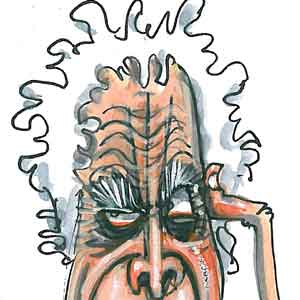
This article is a preview from the Summer 2016 edition of New Humanist. You can find out more and subscribe here.
Redeemable (Bloomsbury) by Erwin James
By the time Erwin James stood in the dock facing trial for double murder at the age of 27, he had averaged two convictions for every year of his life. His first conviction, shortly after his 11th birthday, was for breaking into a television factory with a friend. In his memoir, James maps his journey from birth to juvenile delinquent, to murderer, to reformed convict and writer.
Born in Scotland but endlessly moved between temporary homes in childhood, James charts the aspects of early life that hardened him. His mother’s sudden death in a car crash when he was eight years old triggers the rapid descent of both James and his father. His father, an alcoholic, spends time behind bars and seemingly introduces James to a “new mother” every chapter, as the cast of women changes, most leaving because of domestic violence. James’s behaviour slowly comes to mirror his father’s. Initially shy and perennially anxious about school, his simultaneous love and hatred for his father and his outsider status as a Scot in English schools, James learns how his anxiety melts after several pints of bitter. But alcohol also increases his capacity for violence.
After James’s first daughter arrives, his drinking continues and the relationship collapses. The pub brawls become mindless and 15 years after the first petty theft, James and an accomplice murder two men during muggings and robberies. James goes on the run, joining the French Foreign Legion before he is caught and extradited.
When he is convicted, James says he feels relief. At various points, he confesses a strange disappointment at being placed on probation or fined rather than convicted. He is returned to a life that he feels he cannot escape. Incarceration – though brutal in Wandsworth prison, with suicides, immense boredom and terrible food – is an escape.
His redemption comes not from harsh treatment and lone soul-searching but through the help of a prison psychiatrist. Confused by the presence of the psychiatrist he meets on his first day in prison, James refuses to tell him that he often has suicidal thoughts. After he is moved to HMP Wakefield from Wandsworth after a year, however, the tone of the prison experience changes.
Meeting James on his transfer, after asking details of his life, the prison governor tells him, “Our job is to get you back out and functioning well.” Working with the resident psychologist Joan Branton, James sets out to discover how he had become what he had become – a violent, impulsive career criminal. With Branton’s belief and persistence, James enrols on Open University journalism courses, eventually writing columns for the Guardian newspaper, phoning in his words over the telephone.
Throughout this redemption, James shows how precarious his rehabilitation was. While he studies and works,
several inmates near his cell hang themselves. After working on developing and understanding empathy, James nearly packs in his studies, believing himself unworthy and the struggle to be fruitless. After being offered the Guardian column, he is initially refused and, despite being told originally that he would serve 14 years before being eligible for parole, the Home Office extends this to 25 years. Each of these struggles is overcome and James finds himself free, leaving as a reconstructed man who has spent more of his adult life behind bars than outside.
Without the strong personal investment of the prison psychiatrist and the opportunity to study behind bars, James could easily have ended up reverting to his former behaviour, sliding into drink and violence. That he did not is down to the warmth and time invested in him in prison – a focus on redemption, rather than punishment, which serves to rehabilitate him to the point that he finally accepts the enormity of his crimes and the emotional toll of his actions on his victims, his children and his family. As James shows, a focus on prison as a site of punishment may offer some comfort for victims and the more carceral-minded facets of society but rebuilding prisoners returns them to society as functional people and gives them the emotional intelligence to understand fully the scale and effects of their crimes.

